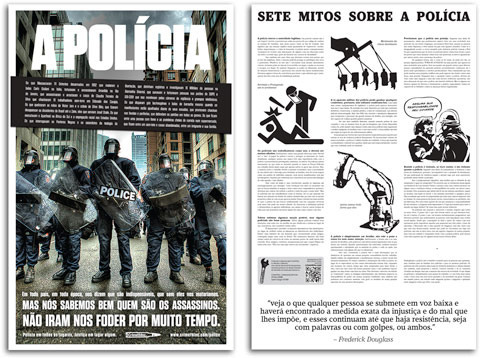CrimethInc.'s Blog, page 9
August 20, 2014
The Making of “Outside Agitators”
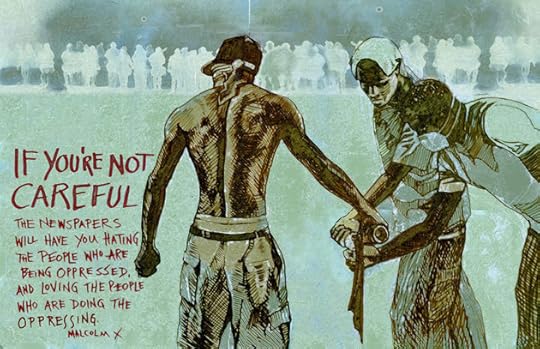
On August 19, ten days after police murdered Michael Brown in Ferguson, Missouri, a slew of corporate media stories appeared charging that “criminals” and “outside agitators” were responsible for clashes during the protests. CNN alleged that “all sides agree there are a select number of people—distinct from the majority of protesters—who are fomenting violence,” quoting a State Highway Patrol Captain, a State Senator, and a former FBI assistant director to confirm this.
But what exactly are “outside agitators”? Where does this concept come from, and how is it deployed? In this feature, we analyze this rhetoric, what functions it serves, and what it conceals.
Read The Making of “Outside Agitators.”
Meanwhile, in response to popular demand, we have made a hasty zine version of our previous article about the events in Ferguson, What They Mean when They Say Peace. Download a printable PDF here [7.1MB].
Finally, the above illustration is available in poster form from artist Corina Dross, to raise funds for arrestees in Ferguson.
August 18, 2014
What They Mean when They Say Peace
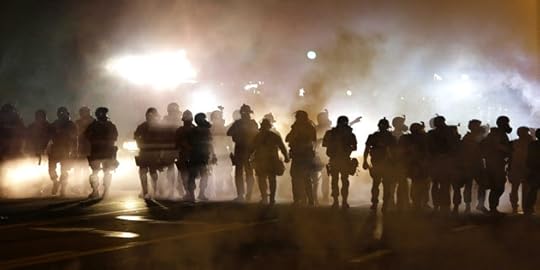
“I’m committed to making sure the forces of peace and justice prevail,” Missouri Governor Jay Nixon said in Ferguson on Saturday, August 16, after a week of conflicts sparked by the police murder of teenager Michael Brown. “If we’re going to achieve justice, we first must have and maintain peace.”
Is that how it works—first you impose peace, then you achieve justice? And what does that mean, the forces of peace and justice? What kind of peace and justice are we talking about here?
August 14, 2014
Staying Safe in the Streets

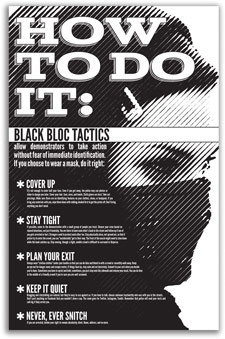 In view of the ongoing police violence in Ferguson, Missouri, comrades have requested that we post some new material about how participants in protests can protect themselves in the streets. If you are participating in dangerous protests, especially if you are part of a group targeted by police violence, please take steps to minimize the likelihood that police and other repressive entities will be able to capture or identify you. You deserve to be safe and free!
In view of the ongoing police violence in Ferguson, Missouri, comrades have requested that we post some new material about how participants in protests can protect themselves in the streets. If you are participating in dangerous protests, especially if you are part of a group targeted by police violence, please take steps to minimize the likelihood that police and other repressive entities will be able to capture or identify you. You deserve to be safe and free!
Here is a handout that was circulated during the protests in Durham, North Carolina against the killing of Jesus “Chuy” Huerta in November 2013. You can read a collection of texts about those protests here.
In addition, here is a short guide to being prepared for public order situations such as those unfolding in Ferguson right now. Thank you for your courage, and good luck.
Mask Up
How & why to protect yourself at demonstrations
People conceal their identities from police and media during demonstrations for many different reasons: school, employment, immigration status, Child Protective Services, right-wing vigilantes. This is important regardless of whether you intend to break the law. The more common we make this practice, the safer everyone can be. Together, we have tremendous power.
Dress Appropriately
 Bring multiple layers: one outfit to get into the area, another for the action, and something that will help you blend in when it’s time to make your exit. Take out piercings; conceal tattoos. Some protesters wear identical clothing—black hooded sweatshirts, pants, and masks—in order to be indistinguishable. If you do this, make sure your clothes have no identifying features. Your shoes or backpack could also identify you.
Bring multiple layers: one outfit to get into the area, another for the action, and something that will help you blend in when it’s time to make your exit. Take out piercings; conceal tattoos. Some protesters wear identical clothing—black hooded sweatshirts, pants, and masks—in order to be indistinguishable. If you do this, make sure your clothes have no identifying features. Your shoes or backpack could also identify you.
If you wear a mask, put it on out of view of cameras or police and keep it on the whole time you’re in action. Cover your hair completely. To a mask out of a T-shirt, stretch the neck hole across your eyes and tie the sleeves tight behind your head, with the rest of the shirt covering your head and shoulders. Police may target isolated masked individuals, so stay together until you reach a safe place to change clothes and disperse.
Goggles can protect your eyes from chemical weapons; sunglasses can make you less recognizable. Both are available in prescription form; beware contact lenses trapping chemical weapons against your eyes. A bandana soaked in apple cider vinegar may help you breathe if you are tear-gassed or pepper-sprayed. Wear cloth gloves; fingerprints stick to latex, and leather gloves leave their own fingerprint.
Come Prepared
You could bring water, first-aid supplies, banners, flags, drums, whistles, a megaphone, a sound system, a sign that doubles as a shield, stickers, spray paint, flares, torches, Christmas tree ornaments filled with paint, firecrackers, a hammer, or a police scanner. Wipe down anything you might lose in the streets with alcohol ahead of time to get the prints off. Consider using a temporary phone instead of your usual one. Remember that your call history and text messages can be traced to you on any phone connected to your name; the police will certainly check these if they capture you. Make sure you know a phone number to call if you are arrested or get separated from your friends and need help.
Stick with friends you trust using the buddy system. Talk ahead of time about what you want to do and how you will communicate. Case the area in advance for targets, materials, danger zones, and escape routes. Plan in advance how and where you can disperse.
In the Streets
Stick together. Don’t let the crowd get stretched out too far; carry messages between the front and back. Friends on bicycles can keep you updated on what’s happening nearby.
Make it clear to the police as soon as they show up that they’re not in charge. Your assertiveness and willingness to protect each other are your permit. Like other bullies, the slightest compromise will embolden them, but if they see that there is no way for them to take control, they may back off. Police will bluff and lie, but you may be able to predict their behavior by what they appear materially prepared to do.
Don’t let officers enter the crowd. Hold banners up along the sides; link arms if you have to. If the police want to grab someone, get in the way. Keep moving so they don’t get a chance to pen you in. If you see them blocking off a street ahead, move fast before they can surround and trap you. Keep them guessing. Quit while you’re ahead.
Behind Enemy Lines
If the police address you, ignore them unless they specify that you are being detained or arrested. If they seize you, don’t resist unless you’re sure you can escape; resisting can get you higher charges. If you are arrested, invoke your right to remain silent. Answer no questions beyond your name and address, no matter what they say. Never tell the police anything about other people, even if it seems insignificant.
Don’t post anything on Facebook, Twitter, or any other site that you wouldn’t show directly to the police. Don’t brag about anything potentially incriminating, or describe others’ actions. Only talk about what happened in a secure environment with people you trust.
The corporate media will repeat the lies of the police. Politicians will try to discredit you or get you to waste time in endless petitioning. Don’t let them intimidate you or stunt your imagination; don’t get sucked into a private grudge match with the authorities. Our power comes from our courage, our dreams, and the connections we build with other people.
Further Reading
August 6, 2014
The Ex-Worker #26: Anarcha-Feminism, Part I

#26: Anarcha-Feminism, Part I: Introduction and Herstory – What is anarcha-feminism, and what contribution has it made to both feminism and anarchism? The Ex-Worker is back with our longest episode to date as we kick off a series exploring anarcha-feminism in the past and present. After framing the issue and dealing with some thorny questions around definitions of feminism and gender, we take a whirlwind tour through the history—or herstory, if you like—of anarchist women from the barricades of the Paris Commune to the front lines of the Spanish Civil War. In addition to Louise Michel, Lucy Parsons, Emma Goldman, and a few other big names, we’ll share lesser-known stories of Russian nihilists, Puerto Rican tobacco workers, Japanese journalists, Mexican guerrillas, and many other unsung heroines of late 19th and early 20th century anarchist struggles. The anthology Quiet Rumors: An Anarcha-Feminist Reader appears on the Chopping Block, and while a member of the Revolutionary Anarcha-Feminist Group from Dublin, Ireland joins us for an interview. Clara and Alanis even take issue with a term from the Contradictionary, on top of a packed calendar of upcoming events, news, and more.
You can download this and all of our previous episodes online. You can also subscribe in iTunes here or just add the feed URL to your podcast player of choice. Rate us on iTunes and let us know what you think, or send us an email to podcast@crimethinc.com. You can also call us 24 hours a day at 202–59-NOWRK, that is, 202–596–6975.
July 30, 2014
‘This Phone is Tapped’ Stickers Retired

After eleven years in service with nearly half a million copies deployed by CrimethInc. agents around the world, we are sad to announce the retiring of our This Phone is Tapped stickers. Sad, because we had hoped to retire them after defeating the rule of ubiquitous surveillance on every form of remote communication, but unfortunately the only thing that has been defeated are payphones. As payphones have disappeared, so has demand for these stickers and as we sent out the last copies this week, we decided not to reprint them—partly because we have a more than capable replacement already in action.
Thanks to everyone who helped cover payphones across the globe over the last decade, as well as achieving placement on the Wikipedia Phone Tapping page and helping out hapless blog editors forced to find images to go with unending stories of mass surveillance.
Over the years we’ve received dozens of emails from payphone owners containing threats both legal and otherwise that were, of course, never followed through on. We’ve collected the most entertaining ones below, verbatim and in their entirety, so you can enjoy their hilarity as well.
Why are you encouraging people to place stickers on the back of payphone handsets telling people the phone is tapped?
Your home phone could be tapped as well and is in fact more likely to be tapped.
Do you place these stickers on your home phones?
Do you realize what this does to people in the payphone business. Do you realize that some people will not use the phone because of that.
Do you realize that is someone is caught putting that sticker on a payphone that I’m going to kick the living shit out of them and then shove a payphone receiver up their ass.
What is the purpose of your web site? Are you trying to help people or screw them?
Do you realize that you are encouraging vandelisim.
You are nothing but a peice of shit.
I hope your family attacked by raving lunitic and beaten with a payphone handset.
I am the owner of several Pay Telephones and very recently your pay phone stickers have made their way to their handsets.
I am concerned for the following reasons:
Advertising on pay phones is not free
defacing pay phones is illegal
interfering with public access and my business is not tolerated.
To that end I will give your company 24hrs to remove said pay phone stickers.
Should you like to advertise on my pay telephones the cost is $35.00 per hand set per month.
I am the owner of a payphone company in upstate New York. Your stickers are appearing on my phones, it does not appear to be hurting my business, however, it is against the law in NYS. Any sticker, taxi, towing, work from home, weight loss, etc., etc. Please instruct your subscribers not to put them on public payphones. My phones are regularly inspected by the NYS Public Service Commission, and if they issue a citation to me for these stickers I have 10 days to remove them or be fined $1,000.00 per incident. I will have the citations forwarded to your company.
I will remove the stickers at this point in time for $25 per location, we have removed 71 as of today. I will send the invoice to your Greensboro NC address. If you wish to have the people you sent them to remove them, they must take care in using solvents to minimize damage.
Lastly, I do allow advertising on my phones, however, the advertising must be in a framed plaque. There is a monthly fee associated with advertising. All advertising must also meet with the property owners concurrence.
Someone is placing these stickers on public payphones throughout NC.
These are privately owned payphones and should not be tampered with.
PLEASE STOP THIS PRACTICE NOW!!!!!!!!!
Thanks in advance for your attention to this matter.
I operate, and own a Payphone company in the PGH area. People are buying these stickers and plastering them all over my phones. I will find out who they are, and have them arrested, or taken to the Majistrate. Our phone lines are NOT allowed to be tapped without our Permission, period. They are classified as a different kind of line, and not subject to the same rules as a Residential line.
You are giving out FALSE information, for which I will report to the INTERNIC, and any other agency that will hear me.
I would like to know WHY you would print this nonsense? Only a complete idiot would make up something like this in order to make money. It is VANDELISM, no matter who dies it, and you are giving them the avenue to do so.
I hope one day some jerk-off puts a bumper sticker on your car without asking, see how you like it. Or paint or post things on your home. You would not like that, I am sure, yet you could care less, as long is it does NOT happen to you.
Your web page is pretty sickening, if yo do not like it here, move to Iraq then. Watch him kill his people in experiemnts and what not. MAYBE not you personally, but your web site REAKS of trators. When war begins, I hope anyone who tries to stop the military is arrested, and shot for treason.
July 16, 2014
Ex-Worker #25: The Brazil World Cup Protests
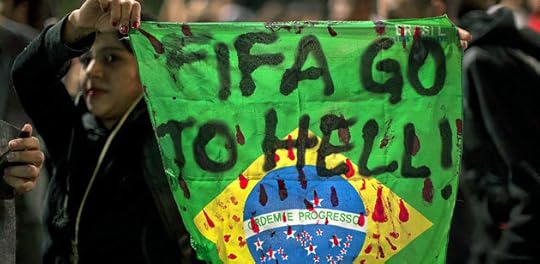
#25: The Brazil World Cup Protests – The recent World Cup prompted widespread protests across Brazil. In our 25th episode, we discuss why these protests took place, who participated, and how they connected to the uprisings of the last year. We share an audio collage of protest voices, an interview with Brazilian anarchists, and a Situationist-inspired critique of mass sports spectacles. The new green anarchist journal Black Seed appears on the Chopping Block, while a Ukrainian anarchist offers perspective on why things may not be so bleak there for anarchists as we thought. And there’s hooliganism, a June 11th rundown, prisoner updates, reflections on the “global village,” and more.
You can download this and all of our previous episodes online. You can also subscribe in iTunes here or just add the feed URL to your podcast player of choice. Rate us on iTunes and let us know what you think, or send us an email to podcast@crimethinc.com. You can also call us 24 hours a day at 202–59-NOWRK, that is, 202–596–6975.
July 7, 2014
Work in German Translation

 Work has just been published in German, thanks to our comrades Black Mosquito. Our poster depicting the pyramid of capitalism is available alongside it in German translation, as well. A German-language speaking tour to present the book is ongoing, following last spring’s Engish-language tour on the same subject.
Work has just been published in German, thanks to our comrades Black Mosquito. Our poster depicting the pyramid of capitalism is available alongside it in German translation, as well. A German-language speaking tour to present the book is ongoing, following last spring’s Engish-language tour on the same subject.
Black Mosquito recently suffered a police raid in which the authorities used a pretext to steal their computers and merchandise. Our comrades remain unstoppable, but should the authorities continue to harass them, we will call for solidarity actions. We would also like to express our appreciation to everyone who has been involved in the occupation of the Hauptmann School in Berlin, taking direct action against police attacks on refugees.
We reproduce here in English our introduction to the German version of Work, which briefly reviews the goals of the project, the context in which it appeared, and the preliminary results.
Notes Introducing the German Translation of Work
We’ve sold 15,000 copies of Work in the past three years, and distributed over 60,000 copies of the accompanying poster. The text has been published in Serbo-Croat, Russian, and Korean, among other languages. We also sent several hundred copies of the book and thousands of posters to rapper POS, who sent them out with his album “We Don’t Even Live Here.” That put the books in the hands of many people who don’t ordinarily seek out anarchist literature; we’ve received really positive feedback from some of his listeners.
As with all of our publications, we approached Work as a multimedia project, not simply a book. It exists on multiple levels: as the “pyramid of capitalism” poster, updating the IWW poster from a hundred years earlier; as a series of other posters, which were pasted across the walls of many cities for months after it was published; as the book itself; as a series of speaking tours spanning three continents, engaging with the subjects it addresses; and finally, as a series of internal discussions aimed at sharpening our understanding of the current economic context and what strategies are best suited to it.
We chose to revise the original IWW poster on account of its centennial, and to express continuity with the old workers’ movement—a great deal has changed, but we are fighting our conditions as our predecessors fought theirs. At the same time, we wanted to depict a more complex pyramid, showing the wide variety of hierarchies created by capitalism and emphasizing that the problem is not the ascendancy of any particular social body but the power imbalances imposed by the market. Rather than a didactic or inflammatory poster, we wanted to create a design that would pose questions.
We began work on Work in mid-2010, when the economic recession had been in effect for more than a year but there was little evidence outside Greece of the global upheavals that were on the way. We had just published “Fighting in the New Terrain,” and aimed to create a general outreach project that would pick up where the projects critiqued in that retrospective left off. Several of us read a wide range of material and met regularly to hammer out a shared understanding of the contemporary economy, starting from the details of our daily lives. Through lengthy arguments, we agreed on the details of the pyramid poster—as well as an analysis of the growth of the service sector, the proper wording of the paragraphs about sex work, and many other challenging issues.
As we were finishing the book at the beginning of 2011, the so-called Arab Spring was underway. At the end of the design process, we included a photograph of a poster bearing text from the draft, which comrades had pasted up outside the occupation of the capitol building in Wisconsin. For a few months after the publication of Work, we were ahead of the course of history, proclaiming to anyone who would listen that no uprising in the United States would spread that began from fixed positions in the economy (such as job security or union rights): that the important thing was to begin from the shared precarity increasingly imposed by capitalism.
This hypothesis was corroborated by the eruption of the Occupy movement. During the following months, we participated in the actions that pushed it to its limits, and organized speaking tours across the country to address protesters newly curious about anarchism and revolution.
In 2012, as the Occupy movement was dying down, comrades in New York City sent us the copy of Work that had been in the Occupy Wall Street library when the New York police raided the encampment and confiscated everything. After months of being passed from one hand to another through rainstorms and pepper spray, and then months more in police custody, the book looked like it had been through a war.
One of the distinctive things about Work is that it is an attempt to distill an anarchist—that is to say, non-Marxist—analysis of the economy. Some Marxists, who (like monotheists) see the workings of their master in everything they behold, have misunderstood the project: for them, there is no critique of capitalism without Marx, so anything that addresses economics must be evaluated as better or worse Marxism. From our perspective, rather than studying the ideas of the Great Men of history, the important thing is to be constantly and collectively refining our own analysis of our conditions, based above all on our firsthand experience.
The process of developing our critique for this book has gone on sharpening our strategic acumen in the years since we sent it to the printers; that critique continues to evolve, as evidenced in our more recent projects such as “Deserting the Digital Utopia.” Above all, Work is meant for those who are committed to updating their resistance to respond to the latest developments on the economic terrain, rather than navigating by blueprints a century and a half old.
This book may be especially relevant in Germany today, precisely because of the differences between the German and US context. Germany has yet to experience a real recession, but all the world is on the same slow track towards economic precarity as the old treaties erode between state and subject, employer and employee. What we are today, so you shall be. Be ready.
For the revolutionary abolition of capitalism and work itself,
-a CrimethInc. ex-Worker
July 1, 2014
The Ex-Worker #24: Communization

#24: Communization – From the incendiary writings of The Invisible Committee prompting arrests on charges of rail line sabotage in France, to the calculated analysis of Theorie Communiste and Aufheben, we may have skipped a few things in our previous two episodes about communism. The current known as communization emerged out of the struggles of May ’68 in France, and to this day the question remains: can we enact communism ourselves, here and now? In this episode of the Ex-worker, we’ll take another angle on communism, away from the backstabbing, newspaper-hocking, withering-state-types profiled in Episodes 20 and 21, instead focusing on those who share our dream of breaking with the misery of our conditions and dismantling this world (even if they still talk like Marxists.) In this episode we experiment with different ways of breaking through some of the heavy theoretical language and ideas, including a reportback from a rather unusual Endnotes reading group, and transmit a theme segment from an autonomous, anonymous podcasting cell. We’ll travel to North and South Korea in our listener feedback section, hear an interview from Anarchist prisoner Michael Kimble about prison struggle in Alabama and the importance of supporting long-term prisoners, and round it out with news and prisoner birthdays.
You can download this and all of our previous episodes online. You can also subscribe in iTunes here or just add the feed URL to your podcast player of choice. Rate us on iTunes and let us know what you think, or send us an email to podcast@crimethinc.com. You can also call us 24 hours a day at 202–59-NOWRK, that is, 202–596–6975.
June 19, 2014
Police Poster Translated for the World Cup
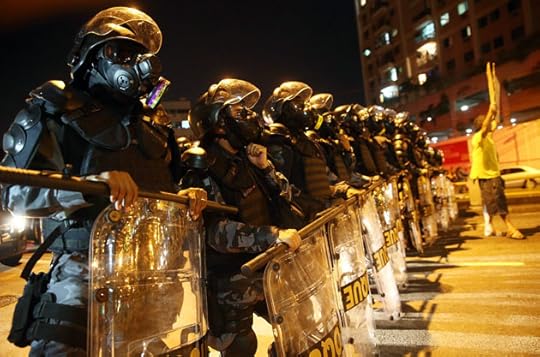
In response to the massive display of violence necessary to make the World Cup a safe zone for capitalist profiteering, our comrades in Brazil have produced a Portuguese version of our classic poster about the police. We present it here in hopes of equipping others throughout the Portuguese-speaking world to respond to the encroachments of authority. Without the servile brutality of the police, none of the social and economic inequalities of our society would be possible, nor the oppression and ecological devastation they entail. Let us delegitimize policing and stand up to police everywhere they operate.
This poster is also available in French and in two different German versions (one, two). We’ll publish a Spanish version here shortly.
June 12, 2014
Why Riot against the World Cup?
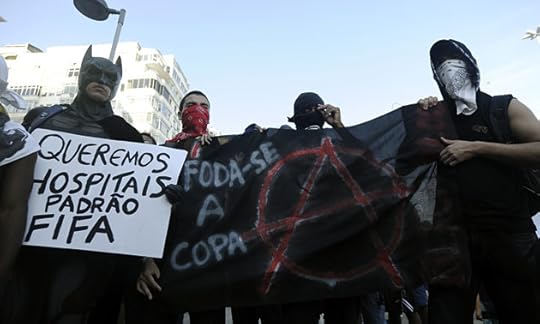
With just a few days left before the 2014 World Cup in Brazil, we conducted an interview with our comrades in São Paulo about the demonstrations that are unfolding. In a wave of unrest emerging on the heels of last year’s riots against proposed transportation fare hikes, thousands are once again flooding the streets and clashing with police in hopes of disrupting the games. We anticipate more unrest in the coming weeks.
CrimethInc.'s Blog
- CrimethInc.'s profile
- 267 followers










